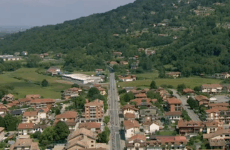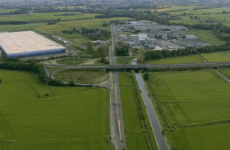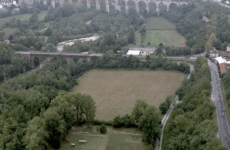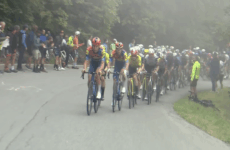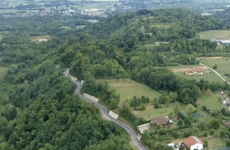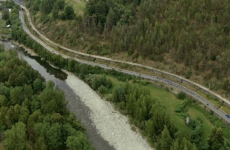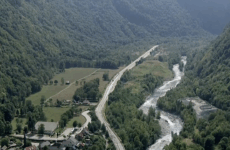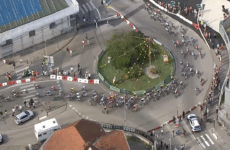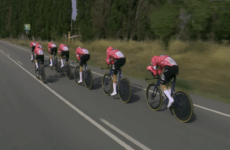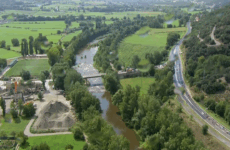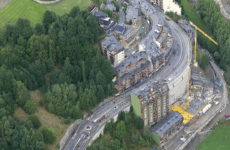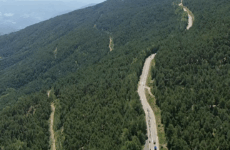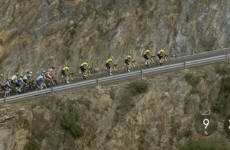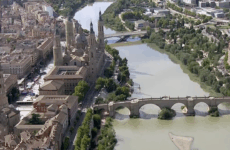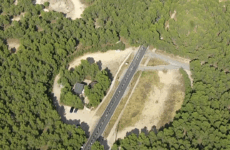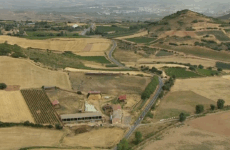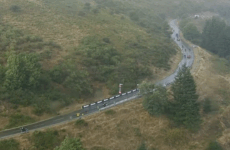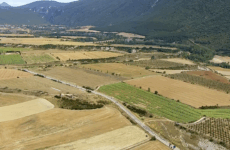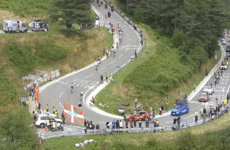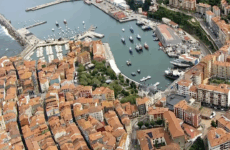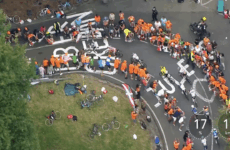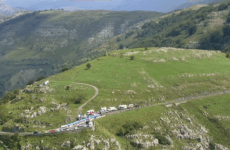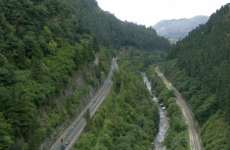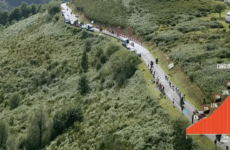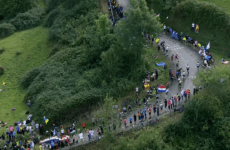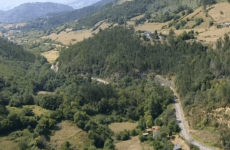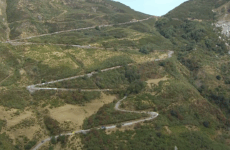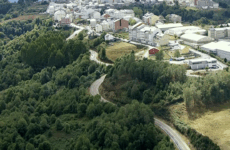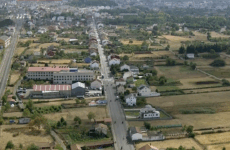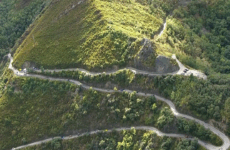Description
September 9, 2025
80th La Vuelta Ciclista a España 2025 🇪🇸 (2.UWT) ME – Stage 16 – Poio – Mos. Castro de Herville : 167,9 km
The 2025 Vuelta a España is a three-week cycling race taking place in Italy,
Show more...
September 9, 2025
80th La Vuelta Ciclista a España 2025 🇪🇸 (2.UWT) ME – Stage 16 – Poio – Mos. Castro de Herville : 167,9 km
The 2025 Vuelta a España is a three-week cycling race taking place in Italy, France, Andorra and Spain. It started on 23 August in Turin, and will finish on 14 September in Madrid. Twenty-three teams are participating in the race.
Due to protests the racejury decided to place the finishline at 8 km from the finish at the start of the final climb. The times for the GC were also taken there.
Colombia’s Egan Bernal (Ineos Grenadiers) sprinted to victory on the improvised finish line of stage 16 of the Vuelta a España, beating Mikel Landa (Soudal-QuickStep) in a two-up sprint as the stage was truncated due to protests.
The stage was cut short, with the final climb removed, after pro-Palestine protesters blocked the road in the final 4km. The organisers instead took the times and the stage winner at 8km from the finish, with the change announced over race radio within the final 20km, and the gantry marking the start of the final climb now acting as the finish line.
Bernal and Landa had been part of a 17-man breakaway that went away after 50km of racing earlier in the day, and were instrumental in pulling out a smaller group, which they eventually whittled down to just two of them.
With not much warning of the change, it was an unusual finish to the stage, but the pair knew they were sprinting for the win, and it was Bernal who proved stronger in the drag to the new finish line, though he did not sit up and celebrate.
Brieuc Rolland (Groupama-FDJ) claimed third from the remainders of the break, with the peloton some seven minutes behind the winner.
In the GC group, Tom Pidcock (Q36.5 Pro Cycling) attempted to attack on the final descent – presumably once they knew the final climb would not be raced – but in the end, the group all finished together, missing the chance for a final fight on the Mos. Castro de Herville.
Despite a brief scare with a puncture on the penultimate climb, Jonas Vingegaard (Visma-Lease a Bike) retains the red jersey at the end of stage 16, still holding a 48-second lead on João Almeida (UAE Team Emirates-XRG).
For Bernal, the circumstances may have been strange, but the win marked his first Grand Tour victory in four years, and his first win outside of the national championships since his horror crash in 2022.
How it unfolded
Rolling out of Poio for a hilly day that looked prime for a breakaway victory, there was a fairly drawn out and active process to establish the day’s breakaway group. Repeatedly, a small group would get away and then get caught again, taking nearly 50km for a group to go. Four riders got away at first after 47km, and then a counter-move of some 13 more bridged across, making a group of 17 up the road.
After over an hour of trying, the breakaway finally seemed to be established, as Visma-Lease a Bike let the gap grow. In the group was: Marc Soler (UAE Team Emirates-XRG), Andrea Bagioli (Lidl-Trek), Jefferson Cepeda (Movistar), Nico Denz (Red Bull-Bora-Hansgrohe), Mike Landa, Mauri Vansevenant (Soudal-QuickStep), Egan Bernal, Bob Jungels (Ineos Grenadiers), Sean Quinn (EF Education-EasyPost), FInlay Pickering (Bahrain Victorious), Clément Braz Afonso, Rudy Molard, Brieuc Rolland (Groupama-FDJ), Victor Guérnalec, Louis Rouland (Arkéa-B&B Hotels), Kevin Vermaerke (Picnic PostNL) and Jake Stewart (Israel-Premier Tech).
The leaders built a gap of just under five minutes, and after an intense and fast start to the day, there was a calming in the middle part of the day, with Visma settling into controlling and the break working well together. The Dutch team weren’t willing to let the gap balloon out too far, but also weren’t keeping them too close.
Over the first categorised climb of the day, the Alto de San Antoñino 80km into the stage, Nico Denz took maximum points, with no huge battle for the top. As the peloton started the next climb and the final 65km, the gap started growing over five minutes.
On the climb, the 11km Alto da Groba, an injection of pace from Landa and Bernal saw them pull a group clear from the breakaway, made up of those two plus Denz, Braz Afonso and Rolland. They pulled out a 22-second gap over the chase group, which itself started breaking apart, with Vansevenant and Stewart the first to drop away. The peloton were now over six minutes behind the chasers.
It was no surprise that several riders couldn’t hold on, as the chasers were riding hard to try and bring back the escapees, and they did bring them within 13 seconds, but the gap went out again as they just couldn’t get organised, and riders were hesitant about bringing Soler back to the front. With 40km to go, the leaders were 30 seconds ahead of the chasers, with the peloton down at seven minutes, still led by Visma.
However, the chasers were not giving up, with Soler pushing hard to try and close the gap. He and Pickering were at one point only a matter of metres behind the leaders, but struggled to make the final junction as the chase group definitively broke apart.
On the Alto de Prado, Denz was the first to be dropped from the leaders, as Landa and Bernal pushed on on the climb, which was only 3.2km long but with ramps in the double-digits gradients. The leaders, now just Landa, Bernal and Braz Afonso, pulled their gap back out to 50 seconds on this climb, despite Soler and Pickering’s best efforts.
In the peloton, Bahrain Victorious took up the chasing efforts, trying to prevent Bernal from troubling Torstein Træen’s position in the top 10, and this injection of pace saw riders drop in their droves as the peloton took on the Alto de Prado.
Soler and Pickering were being re-joined by other breakaway riders into the final 20km, as their chances of catching the lead of the race looked to be going away from them. It didn’t take long, then, for Soler to sit up – or be told to sit up – and wait for the GC group.
Just a few kilometres into the Prado climb, the GC group had shrunk to fewer than 15 riders with the gradients really testing even the strongest of riders. There was a stressful moment for Vingegaard, who punctured near the top of the climb, but quick action from Ben Tulett saw him climb into his teammate’s bike and swiftly rejoin the GC group.
The same issue ended Braz Afonso’s time in the lead group, as he punctured without a teammate to help him, leaving just Bernal and Landa in the lead with 15km to go.
At this point, it was announced that the stage would be shortened, and the winner decided 8km from the line, due to large protests in the finale. This cut out the final climb, and left just 7km to race instead of the full 15. Unlike stage 11, where GC times were taken but no winner was give, a stage winner was to be crowned on stage 16.
Bernal and Landa received this news well in advance, and knew they were racing for the win into the finale. The win would have been a big moment for either rider who have had their fair share of bad luck, but as the improvised finish line honed into view, it was Bernal who had the stronger uphill sprint and claimed the victory.
In the GC group, Pidcock tried to get away on the final descent, sensing a final chance to take time, but ultimately the overall contenders did not really contest the finale – unlike how they raced in Bilbao on stage 11 – with the GC group all rolling into the finish together on the same time with Vingegaard retaining red.
The only rider who was not present was Felix Gall (Decathlon AG2R La Mondiale), who lost nearly a minute after struggling on the Alto de Prado, and slipped from fifth to sixth, swapping places with Giulio Pellizzari (Red Bull-Bora-Hansgrohe).
With his win, Bernal moved up two places to 12th on GC, still 9:36 down on leader Vingegaard.
Results :










